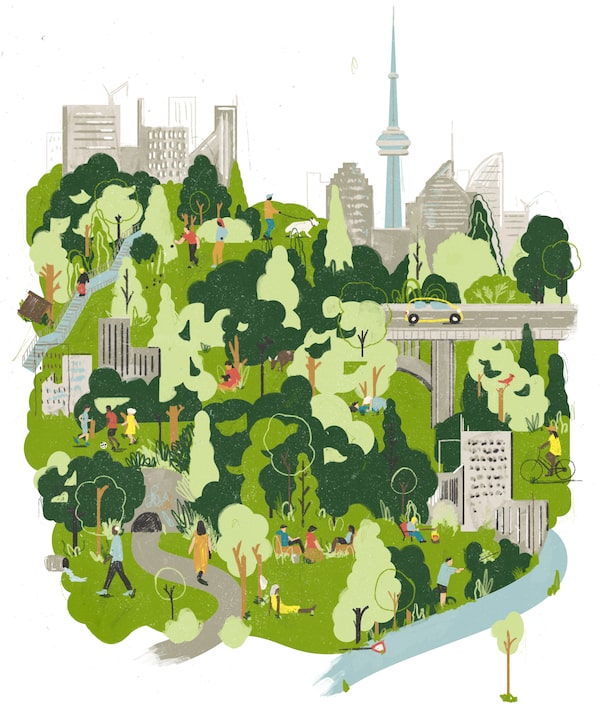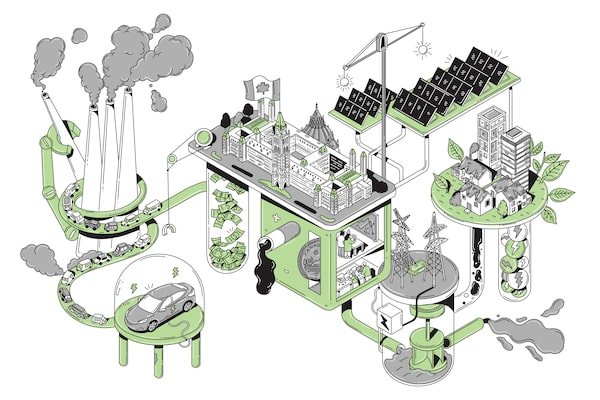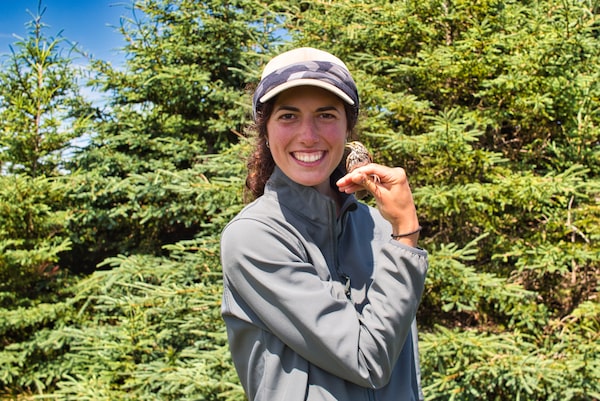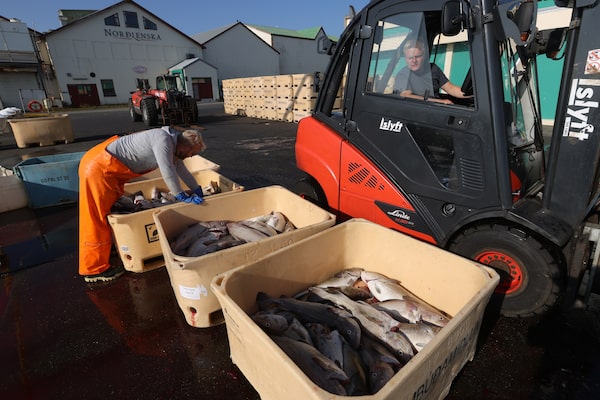If you’re reading this on the web or someone forwarded this e-mail newsletter to you, you can sign up for Globe Climate and all Globe newsletters here.
Good afternoon, and welcome to Globe Climate, a newsletter about climate change, environment and resources in Canada.
We recently took a look at one of the most intelligent birds in the world, and how the crow can be more inspiring than ominous if we can learn to appreciate the nature in our urban spaces.
For Andrea Curtis, her greatest pandemic discovery has been finding the wild in the city by exploring Toronto’s ravines. “Before the pandemic I might have found these places too urban and touched by human hands to be beautiful,” she said. “The city’s edges reflect back our new normal – where grit and beauty are deeply intertwined.”
In our backyards, off our balconies and out in our parks, we see the natural world everywhere – we need only take the time to look. Wild in the City highlights the biodiversity that exists in and around our cities by showcasing a subject from nature each month – it could be a bird, a tree, a river, a stream or a prairie meadow. Do you have a story to tell? Get in touch at globeclimate@globeandmail.com.
Now, let’s catch you up on other news.

Illustration by Kumé Pather
Noteworthy reporting this week:
- “It’s health, it’s seed sovereignty, it’s food sovereignty”: How Indigenous-led agriculture in B.C.’s Peace River region is a beacon of hope amid an uncertain future
- Scientists working with the world’s most powerful laser say that they are closing in on the holy grail of nuclear research: raising the temperature and pressure of matter so high that it starts producing more energy than it takes to put it in that state.
- Analysis from The Narwhal: How Indigenous cultural burning practices benefit biodiversity.
- Potential Algonquin Power deal may have American Electric singing a different tune as the Ontario-based company sees opportunity replacing CO2-spouting plants with green power sources.
A deeper dive
Why the next federal government will need a plan to double our supply of clean electricity
Ryan MacDonald is a senior editor at The Globe heading the climate, environment and resources team.
I was in Kapuskasing, Ont. over the weekend, like many Canadians soaking up the last days of summer and visiting family. Hours after we left, a friend texted to say we’d left just in time – a good time to head North, he said, as another heat wave blanketed southern Ontario and Quebec. But we didn’t escape the heat. It was 32 C in Kap over the weekend. Everyone was talking about the hot, humid weather and invariably, how the climate was changing. There was also a lot of talk about a federal election.
This election is going to pivotal for climate policy in Canada. And here at Globe Climate we’re committed to driving some of the conversations that aren’t happening – but should be – on the campaign trail.
We begin that conversation with Adam Radwanski’s excellent piece on why Canada needs to modernize the country’s electricity grids. It is one of the biggest uphill battles that the next government will need to take on. Getting there will take co-operation between provinces, big investments and leadership. It’s a huge challenge.
As Canada moves to ‘electrify everything’ to reach its goal of net-zero emissions by 2050 – demand for electricity is going to increase. Big time. The time is now to start thinking about how we make our electricity grids smarter for the future.
- Ryan
Worth reading: Canada’s disappearing coastline: How climate change puts our beaches in jeopardy

Illustration by Kathleen Fu
What else you missed
- The number of wildfires in British Columbia are down slightly this week, though there may be up to 40 km/h winds in Kamloops where the “out-of-control” White Rock Lake wildfire is burning.
- Three in four people living in the world’s 20 major economies believe nature and the Earth’s climate are approaching potentially abrupt or irreversible changes due to human action, according to a study.
- The Biden administration challenged a federal judge’s decision in June to block the Interior Department’s pause on oil and gas leasing on public lands and waters but will proceed with leasing during the appeals process.
- IKEA will begin selling renewable energy to households in Sweden this September.
Opinion and analysis
Editorial board: Why is Joe Biden, who hung up on Keystone XL, desperately calling OPEC’s oil hotline?
Green Investing
Last week, the world’s largest mining company, BHP Group Ltd., signalled its future is focused on sustainable industries by committing $7.5-billion to a massive Saskatchewan potash project while exiting the oil and gas business.
The restructuring speaks volumes about how chief executive officer Mike Henry sees the economy decarbonizing to deal with climate change in the coming decades. And according to Jeffrey Jones, It also shows how the Canadian-born CEO sees investors reacting to those risks. Even further, BHP is creating more expectation among investors that the companies they are funding will take bold action to shield them against climate risks.
- Also: Ten Canadian stocks that manage their ESG risks and reinvest their earnings for growth
Making waves
Each week The Globe will profile a Canadian making a difference. This week we’re highlighting the work of Hayley Wilson doing bird conservation.

Hayley WilsonHandout
Hi, I’m Hayley Wilson, 28, from Guelph, ON, and I’m a PhD Candidate at the University of Guelph. Every year, millions of birds are killed by human-driven causes. When I learned this, it became my mission to inspire others to help prevent bird deaths. In October 2020, I founded Bird Safe Guelph (BSG), a community of individuals dedicated to wild bird conservation within Southern Ontario.
Birds fly into windows because they can’t see glass, but this can be prevented with inexpensive and easy solutions. So far, BSG has had hundreds of people engage with our program and have seen many inspiring, at-home transformations!
We are beginning to see change within our city and would love to begin sharing our program with others across Canada. Check out our social media, and feel free to reach out with any questions. Together, we can create cities where we can live in harmony with our feathered friends. As Margaret Mead said, “Never doubt that a small group of thoughtful committed citizens can change the world. Indeed, it is the only thing that ever has.”
- Hayley
Do you know an engaged individual? Someone who represents the real engines pursuing change in the country? Email us at GlobeClimate@globeandmail.com to tell us about them.
Photo of the week

Fisherman Will Olivsson (L) sorts his catch of cod and pollack on August 16, 2021 in Hofn, Hornafjordur, Iceland. Global warming is contributing to a rise in temperatures in the waters around Iceland, which is effecting the fishing industry. Changing temperatures have a strong influence on where species of fish find habitat, leading to shifts in the fishing catch.SeanGallup/Getty Images
Catch up on Globe Climate
- Five climate change myths to shut down
- How do we know humans are causing climate change?
- Climate refugees are coming. We aren’t ready
- Carbon tariffs are here. It’s time for Canada to act
We want to hear from you. Email us: GlobeClimate@globeandmail.com. Do you know someone who needs this newsletter? Send them to our Newsletters page.
 Sierra Bein
Sierra Bein